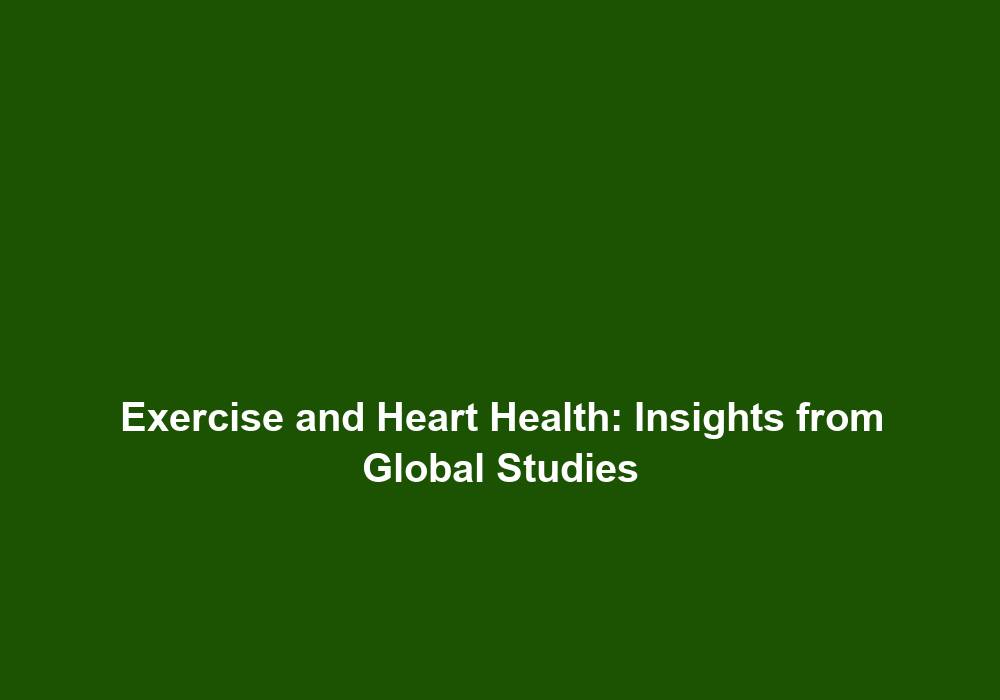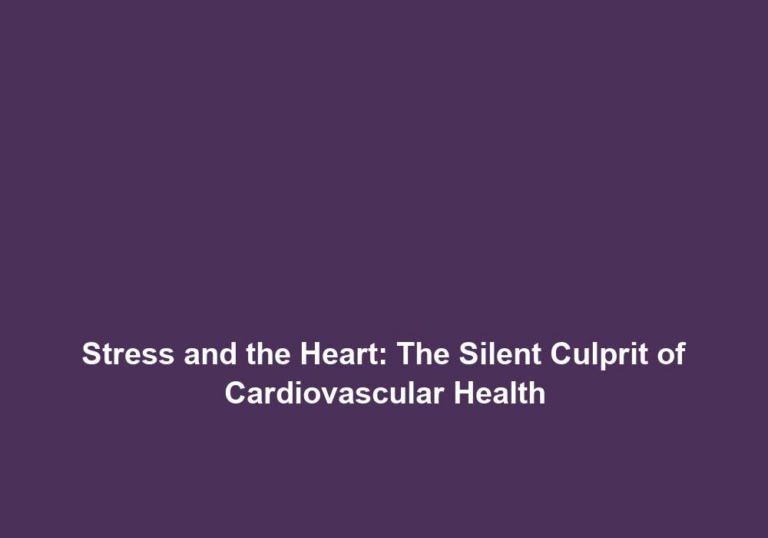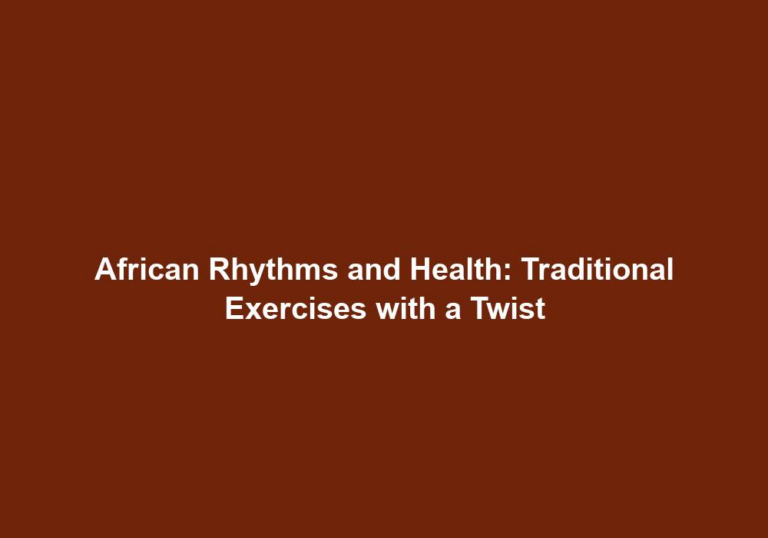Exercise and Heart Health: Insights from Global Studies
Regular exercise is essential for maintaining good heart health and preventing cardiovascular diseases. Numerous global studies have demonstrated the significant impact of exercise on reducing the risk of heart conditions such as heart disease, stroke, and high blood pressure. In this article, we will delve into the insights provided by these studies, highlighting the benefits of exercise and providing recommendations for incorporating physical activity into your daily routine.
The Global Burden of Heart Diseases
Heart diseases are a leading cause of death worldwide, accounting for millions of fatalities each year. Sedentary lifestyles, poor dietary habits, and lack of physical activity contribute significantly to the rising prevalence of heart conditions. However, research has shown that a regular exercise regimen can effectively reduce the risk of developing heart diseases, improve overall cardiovascular health, and enhance longevity.
The Impact of Sedentary Lifestyles
Sedentary lifestyles, characterized by prolonged periods of sitting or physical inactivity, have become increasingly common in today’s modern society. This sedentary behavior has detrimental effects on heart health, leading to an increased risk of heart diseases. Engaging in regular exercise helps counteract the negative impact of sedentary lifestyles by promoting cardiovascular fitness and reducing the risk of developing heart conditions.
The Role of Poor Dietary Habits
In addition to sedentary lifestyles, poor dietary habits contribute to the burden of heart diseases. Consuming a diet high in saturated and trans fats, cholesterol, sodium, and added sugars increases the risk of developing high blood pressure, abnormal lipid levels, and obesity – all of which are major risk factors for heart conditions. Regular exercise, combined with a balanced and nutritious diet, can help mitigate these risks and promote heart health.
Lack of Physical Activity
A lack of physical activity is a significant contributor to the global burden of heart diseases. Many individuals lead busy lives and struggle to find time for exercise. However, incorporating physical activity into daily routines is crucial for maintaining good heart health. This can be achieved by engaging in activities such as brisk walking, cycling, swimming, or participating in sports. Finding enjoyable activities that can be integrated into one’s lifestyle increases the likelihood of long-term adherence and promotes heart health.
Exercise and Cardiovascular Health
Engaging in regular physical activity has been associated with a range of benefits for cardiovascular health. These benefits include:
-
Improved Heart Function: Exercise strengthens the heart muscle, making it more efficient in pumping blood throughout the body. Regular physical activity can lead to a lower resting heart rate, increased stroke volume, and improved cardiac output.
-
Reduced Blood Pressure: High blood pressure is a significant risk factor for heart diseases. Studies have consistently shown that exercise can help lower blood pressure levels, reducing the strain on the arteries and decreasing the risk of hypertension.
-
Enhanced Blood Lipid Profile: Regular exercise has been found to increase the levels of HDL (high-density lipoprotein) cholesterol, also known as good cholesterol, while decreasing LDL (low-density lipoprotein) cholesterol, or bad cholesterol. This favorable alteration in the lipid profile helps prevent the accumulation of plaque in the arteries, reducing the risk of atherosclerosis and related cardiovascular events.
-
Weight Management: Maintaining a healthy weight is crucial for heart health. Exercise plays a vital role in weight management by burning calories, increasing metabolism, and promoting fat loss. Regular physical activity can help prevent obesity and its associated cardiovascular complications.
-
Reduced Inflammation: Chronic inflammation is a common underlying factor in the development of heart diseases. Regular exercise has been shown to have anti-inflammatory effects, reducing the levels of inflammatory markers in the body. By mitigating inflammation, exercise helps protect the arteries and reduces the risk of plaque formation.
The Mechanisms Behind Improved Heart Function
Regular exercise strengthens the heart muscle through a process called cardiac hypertrophy. This process involves an increase in the size and thickness of the heart chambers, allowing them to pump blood more efficiently. Additionally, exercise stimulates the growth of new blood vessels, improving blood flow to the heart and other organs. These adaptations result in a lower resting heart rate, increased stroke volume (the amount of blood pumped with each heartbeat), and improved cardiac output (the total amount of blood pumped by the heart per minute). By enhancing heart function, exercise reduces the workload on the heart and lowers the risk of heart diseases.
The Effects of Exercise on Blood Pressure
High blood pressure, or hypertension, is a major risk factor for heart diseases. Regular exercise has been shown to have antihypertensive effects, leading to a reduction in blood pressure levels. This is primarily attributed to the dilation of blood vessels during physical activity, which improves blood flow and reduces the resistance against which the heart pumps. Additionally, exercise helps regulate the balance of hormones and chemicals in the body that influence blood pressure, further contributing to its beneficial effects. By maintaining healthy blood pressure levels, exercise decreases the strain on the arteries and minimizes the risk of developing cardiovascular conditions.
The Role of Exercise in Lipid Management
Maintaining a healthy blood lipid profile is crucial for heart health. Regular exercise has been found to positively influence lipid levels, promoting a favorable balance between HDL and LDL cholesterol. HDL cholesterol acts as a scavenger, removing LDL cholesterol from the bloodstream and transporting it to the liver for processing and excretion. By increasing HDL cholesterol and decreasing LDL cholesterol, exercise helps prevent the buildup of plaque in the arteries, reducing the risk of atherosclerosis and related cardiovascular events. Additionally, exercise improves triglyceride levels, another type of blood lipid that plays a role in heart health. By enhancing lipid management, exercise offers comprehensive benefits for cardiovascular health.
The Impact of Exercise on Weight Management
Maintaining a healthy weight is essential for heart health, as obesity is a significant risk factor for cardiovascular diseases. Regular exercise plays a crucial role in weight management by burning calories and promoting fat loss. Physical activity increases the body’s energy expenditure, leading to a calorie deficit and subsequent weight loss. Additionally, exercise boosts metabolism, allowing the body to efficiently utilize calories and prevent weight gain. By incorporating regular physical activity into one’s routine, individuals can achieve and maintain a healthy weight, reducing the risk of heart conditions.
Exercise as an Anti-Inflammatory Agent
Chronic inflammation is a common underlying factor in the development of heart diseases. Regular exercise has been shown to have anti-inflammatory effects, reducing the levels of inflammatory markers in the body. Exercise helps modulate the production and release of cytokines, which are proteins involved in the inflammatory response. By mitigating inflammation, exercise protects the arteries from damage and reduces the risk of plaque formation. Furthermore, exercise promotes the release of endorphins, which are natural painkillers and mood enhancers. This dual effect of reducing inflammation and improving well-being contributes to the overall positive impact of exercise on heart health.
Insights from Global Studies
Numerous studies conducted across different countries and populations have provided valuable insights into the relationship between exercise and heart health. These studies highlight the following key findings:
-
Dose-Response Relationship: Research consistently demonstrates a dose-response relationship between exercise and cardiovascular health. This means that the more physical activity an individual engages in, the greater the benefits for their heart health. Engaging in moderate-intensity aerobic exercise for at least 150 minutes per week, or vigorous-intensity exercise for 75 minutes per week, is recommended for optimal cardiovascular benefits.
-
Type of Exercise Matters: Different types of exercise have varying effects on heart health. Aerobic exercises such as walking, cycling, swimming, and jogging have been shown to be particularly beneficial for cardiovascular health. These exercises increase heart rate and improve cardiovascular fitness. Additionally, strength training exercises, such as weightlifting, improve muscle strength and can contribute to overall heart health.
-
Consistency is Key: The benefits of exercise for heart health are best achieved through consistent, long-term engagement in physical activity. It is important to incorporate exercise into your daily routine and make it a habit rather than relying on sporadic bursts of activity. Regular exercise sustains the positive effects on heart health and reduces the risk of developing cardiovascular diseases.
-
Exercise for All Ages: The benefits of exercise extend across all age groups. Studies have shown that even individuals in their later years can significantly improve their heart health through regular physical activity. Engaging in appropriate exercises, based on individual capabilities and health conditions, is essential for reaping the benefits of exercise at any age.
The Importance of Consistency in Exercise
Consistency is a crucial factor in reaping the long-term benefits of exercise for heart health. Engaging in physical activity sporadically or infrequently does not provide the same level of protection against heart diseases as consistent, regular exercise. By making exercise a daily habit, individuals can ensure the sustained positive effects on cardiovascular health. Consistency also helps establish a routine, making it easier to incorporate physical activity into one’s lifestyle. Whether it’s dedicating a specific time each day for exercise or finding opportunities for active breaks throughout the day, maintaining consistency is key for optimal heart health.
The Role of Individual Capabilities and Health Conditions
Exercise recommendations may vary based on individual capabilities and existing health conditions. It is important to consult with a healthcare professional or a certified fitness trainer before embarking on a new exercise regimen, especially if you have pre-existing medical conditions or are new to exercise. These experts can provide personalized guidance, taking into account your specific needs and limitations. By tailoring exercise plans to individual capabilities and health conditions, the benefits of exercise can be maximized while minimizing the risk of injury or adverse effects.
Recommendations for Incorporating Exercise into Your Routine
Now that we understand the importance of exercise for heart health, here are some practical recommendations for incorporating physical activity into your daily routine:
-
Start Slow: If you are currently inactive, it is important to start slowly and gradually increase the intensity and duration of your exercise routine. Begin with activities such as brisk walking or light swimming, and gradually progress to more challenging exercises. This gradual approach allows your body to adapt and reduces the risk of injury.
-
Find Activities You Enjoy: Engaging in physical activities that you enjoy increases the likelihood of long-term adherence. Whether it’s dancing, cycling, hiking, or playing a sport, find an activity that brings you joy and make it a part of your regular routine. This not only makes exercise more enjoyable but also helps to sustain motivation.
-
Set Realistic Goals: Set achievable goals for your exercise routine and track your progress. Start with small, attainable targets and gradually increase the duration and intensity over time. Celebrate your milestones and stay motivated. Setting realistic goals helps maintain a sense of accomplishment and encourages continued engagement in physical activity.
-
Mix it Up: Incorporate a variety of exercises into your routine to keep it interesting and prevent boredom. Combining aerobic exercises with strength training and flexibility exercises provides comprehensive benefits for your heart health. This variety also helps target different muscle groups and enhances overall fitness.
-
Make it a Habit: Aim to make exercise a regular part of your daily life. Schedule dedicated time for physical activity and treat it as a priority. Consistency is key to reaping the long-term benefits for your heart health. By making exercise a habit, it becomes easier to maintain and integrate into your lifestyle.
In conclusion, exercise plays a crucial role in maintaining good heart health and preventing cardiovascular diseases. Insights from global studies highlight the multitude of benefits exercise offers, including improved heart function, reduced blood pressure, enhanced blood lipid profile, weight management, and reduced inflammation. By understanding the importance of exercise and incorporating physical activity into our daily routines, we can take proactive steps towards ensuring a healthy heart and a healthier life.







